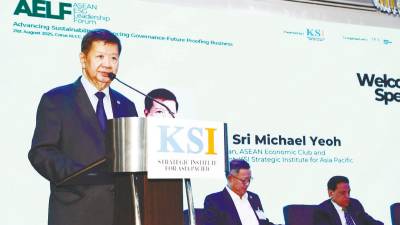KUALA LUMPUR: Asean businesses must remain steadfast in their commitment to environmental, social and governance (ESG) principles despite growing global scepticism, regional leadeers said, warning that sustainability is now central to competitiveness, resilience and long-term growth.
Asean Economic Club chairman and KSI Strategic Institute for Asia Pacific president Tan Sri Michael Yeoh said businesses must not be swayed by political resistance abroad.
“Amidst growing global uncertainty and doubts about the future of ESG with (US) President (Donald) Trump’s pushback, the future of ESG remains relevant and essential to save the planet and transition to a greener world and the green economy,” he said at the Asean ESG Leadership Forum 2025 today.
Asean must remain resolute in aligning ESG adoption with the United Nations Sustainable Development Goals (SDGs) while ensuring that small and medium enterprises are supported in their transition, Yeoh said.
He also stressed that the effects of climate change are no longer distant threats.
“Global warming is no longer just a theory but is real and impacting the world. Plastic pollution is a significant threat to our environment and health. We need to focus more on the circular economy and promote the three Rs (reduce, reuse, recycle),” Yeoh added.
ESG Association of Malaysia president Prof Cheah Kok Hoong said ESG has become indispensable for companies of all sizes and is no longer a “peripheral agenda.”
“ESG is central to competitiveness, risk management and reputation in a connected global economy,” he said.
“For SMEs, ESG is both an enabler and a lifeline, allowing them to enhance resilience, build trust with stakeholders and align with global supply chains that increasingly demand sustainable practices.”
Cheah said Asean’s diversity could be its greatest strength if countries collaborate to share knowledge, establish interoperable standards and accelerate ESG adoption across borders.
He highlighted Malaysia’s recent progress in policy alignment through the National Sustainability Reporting Framework (NSRF), which is designed to match international benchmarks set by the International Sustainability Standards Board (ISSB).
“By aligning with the NSRF and ISSB standards, Malaysia signals to global investors and partners that our companies are serious about transparency and credibility,” Cheah said.
“ESG is no longer about whether we should act, but how fast and how effectively we can act.”
Cheah also introduced ESGAMConnect, Malaysia’s first artificial intelligence-powered ESG digital ecosystem, launched in June, which aims to help SMEs identify priorities, access sector-relevant guidance, and connect with verified partners.
The platform, developed in collaboration with iForte and supported by agencies such as Malaysia Digital Economy Corporation and the SME Association of Malaysia, features integrated modules covering learning, reporting, accreditation, financing, and carbon credits.
Cheah said the initiative is designed to make sustainability knowledge and resources more accessible, actionable and scalable for businesses of all sizes.
He warned, however, that technology must be deployed responsibly. “Our responsibility is to ensure that digital transformation advances inclusivity, accountability and long-term resilience, not greenwashing,” he said.
The one-day forum featured plenary sessions addressing the integration of ESG into corporate strategy, scaling up implementation for SMEs, and climate action.
Speakers from Bursa Malaysia, Alliance Bank, EY Malaysia, SME Association of Malaysia and other regional organisations emphasised that sustainable finance, circular economy models and carbon credit opportunities are critical instruments for building long-term economic resilience across Asean.
In her keynote address, Datuk Seri Rohani Abdul Karim, adviser to the Society for Promotion of SDGs and former minister of women, family and community development, insisted that ESG must be rooted not only within corporate strategies but also embedded in social policies.
She argued that inclusive growth and family well-being are fundamental to sustainable development, warning that without strong communities, economic gains remain fragile.
In his closing remarks, Yeoh rallied delegates with a call to collective action.
“Together, let us strive to create a better, cleaner and greener Malaysia and the world,” he said.
